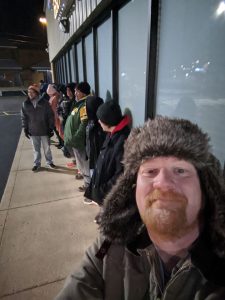High demand drains central Illinois marijuana supplies
January 20, 2020
On Jan. 1, enthusiastic customers waited in long lines outside of NuMed on Riverside Drive in East Peoria and Trinity Compassionate Care on University Street in Peoria to legally purchase recreational cannabis products. Supplies, however, were quickly depleted in Illinois and both dispensaries have had to operate on a day-to-day basis. (Photo courtesy of D. J. Wolf)
In less than a week, Illinois’ recreational marijuana market went from boom to bust, after high demand all but emptied out supplies throughout the state.
The Illinois Department of Financial and Professional Regulation announced that statewide adult-use cannabis sales from Wednesday, Jan. 1 through Sunday, Jan.12 totaled $19,709,345.10. Dispensaries across the state rendered 495,385 transactions over the 12-day period.
Nearly one-third of the receipts were dated Jan. 1. Illinois’ $3.1 million in single-day sales tops that of Colorado, which rang in a paltry $1 on Jan. 1, 2014.
Now, it’s hit-or-miss at NuMed in East Peoria and Trinity Compassionate Care in Peoria and both licensed dispensaries are operating on a day-to-day basis, with a limited menu of most edible items and oil vaporizers.
“Sorry folks, we’re still trying to get enough flower in stock to meet the demand of our medical patients,” NuMed told its customers on Jan. 11. “As soon as we can get more from the cultivators, we will make it available for all. We would love to be able to provide flower to everyone that wanted it it.”
Flower, for those not in the know, is the smokeable bud of the plant. NuMed and Trinity are currently reserving the flower for medical patients.
“I said from the get go that if this takes off, there is no way 22 facilities will ever be able to supply Illinois with enough recreational weed,” said Dan Atherton of East Peoria. He is a legal cannabis advocate and investor. “Everybody’s going to suffer through this, and, in the meantime, the black market is going to thrive.”
Dispensaries are the only legal sellers of marijuana, so outside sales and trafficking still carry criminal charges in Illinois. Despite that, illegal marijuana sales are expected to eclipse legal sales well into 2024, according to the cannabis research firm, BDS Analytics.
At most dispensaries, a gram of flower costs around $20, with a half-ounce serving, 14 grams, coming in at around $280 before taxes. On the street, a half-ounce bag of bud will cost around $120-$150, no tax, of course. Illinois slaps heavy taxes on cannabis, and employs a method unlike any other recreational marijuana state.
First, there’s the recreational taxes. Illinois imposes a 10 percent tax on products with less than 35 percent THC, the psychoactive substance in cannabis). That percentage rises to 25 percent with higher THC-level goods. Cannabis-infused edibles carry a 20 percent tax.

NuMed in East Peoria is a licensed marijuana dispensary. Demand for legal recreational marijuana is far outpacing supplies in the region, according to NuMed and other dispensaries. (Photo courtesy of NuMed)
Add another 8 percent or so in Illinois sales tax, along with city and county sales taxes and the total taxes can rise to around 40 percent of the subtotal. With taxes, a dispensary purchase of half-an-ounce of pot comes to around $400.
The Illinois Cannabis Regulation and Tax Act does allow for 40 licensed craft growers to begin producing more products, but Atherton said that process is slow and expensive. Dispensaries likely wouldn’t see an increase in goods from those sources for at least a year.
“They’re going to turn out 40 craft growers by June or July, and those people are going to wait to be approved before they make the investment in seed and facility construction,” he explained. “It’ll still take four to six months to build, then another three months for growing and they won’t have product until next spring, unless they gamble and spend money ahead of time.”
That’s a big gamble for hopeful applicants, who must first pay a $5,000 non-refundable application fee. Once approved, there’s an additional $40,000 licensing fee, and then comes the process of meeting state mandates on craft growing.
For now, Atherton said, people will have to wait for daily reports from local dispensaries on which products have arrived, or rely on alternative sources. Regardless of the source, cannabis products can be legally transported and used under certain circumstances.
Anyone 21 or older may legally have 30 grams of cannabis flower, 500 milligrams of THC and 5 grams of cannabis concentrate. While in a motor vehicle, all cannabis products must be kept out of reach in a sealed, secure, child-safe container.
Cannabis products may not be used in public places, motor vehicles, on school grounds or any place where smoking is prohibited under the Smoke Free Illinois Act. Most municipalities may have additional ordinances in place regarding consumption.
In Peoria and Tazewell Counties, to find out more about dispensary hours of operation and updated menus, visit http://trinitymmj.com/ and https://numed.com/east-peoria/.







